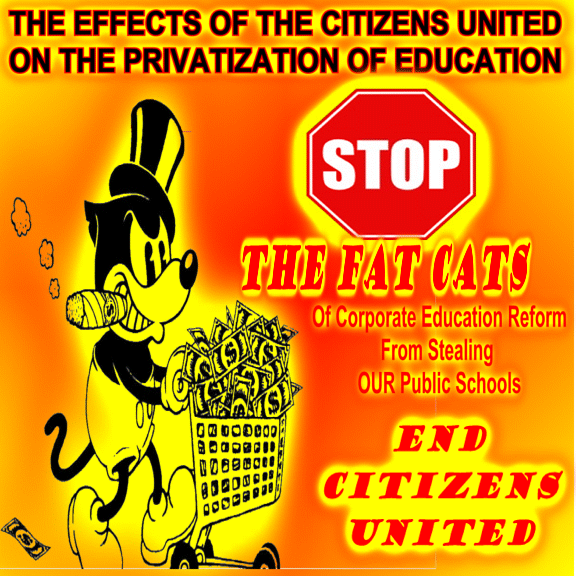THE EFFECTS OF THE CITIZENS UNITED ON THE PRIVATIZATION OF EDUCATION
The Citizens United Supreme Court decision, which was handed down in 2010, has been widely criticized for its negative impact on American democracy. In essence, the decision allowed corporations and other organizations to spend unlimited amounts of money on political campaigns, effectively giving them a louder voice in the political process than individual citizens.
Many people believe that this decision has led to a situation in which politicians are beholden to their wealthy donors rather than to the people they were elected to serve. This has led to a great deal of cynicism and disillusionment among voters, who feel that their voices are not being heard in the political process.
Furthermore, the Citizens United decision has made it easier for special interest groups to influence elections and shape public policy in their favor. This has led to a situation in which powerful corporations and interest groups can effectively buy influence and shape the political landscape to suit their own interests, often at the expense of the broader public good.
The impact of the Citizens United decision has extended beyond just politics and has had a significant impact on the privatization of public education in the United States. The decision allowed for the creation of Super PACs, which are political action committees that can raise and spend unlimited amounts of money on political campaigns.
In the context of education, this has meant that wealthy individuals and corporations can use Super PACs to influence the political process and shape education policy in their favor. For example, wealthy donors can use Super PACs to support candidates who are in favor of school privatization, which involves the transfer of public funds to private schools or the creation of charter schools.
This has led to a situation in which private interests are able to exert significant influence over public education policy, often at the expense of students and their families. Critics argue that this has resulted in a two-tiered education system, in which wealthy students attend well-funded private schools while low-income students are left with underfunded public schools.
The impact of privatization on the quality of education in the United States is a topic of debate among educators, policymakers, and the public. Proponents of privatization argue that competition between schools and the introduction of market forces can improve the quality of education. However, critics argue that privatization can lead to increased inequality, decreased accountability, and reduced funding for public schools.
Research has shown mixed results on the impact of privatization on the quality of education. Some studies suggest that charter schools, which are publicly funded but privately operated, perform no better or worse than traditional public schools. Other studies suggest that charter schools can lead to improved student outcomes in certain contexts.
However, critics argue that the growth of charter schools and other forms of privatization can have negative effects on public schools. For example, as more students leave traditional public schools for charter schools, public schools may be left with a higher concentration of disadvantaged students and fewer resources to support them.
Allowing corporations to have a greater role in education policy making can have several potential consequences. One of the main concerns is that it could lead to the privatization of education, where corporations would have more control over schools and education systems. This could result in a focus on profit rather than the quality of education, leading to a decline in educational standards. Additionally, it could exacerbate existing inequalities, as corporations may be more likely to invest in schools in affluent areas, leaving schools in low-income areas struggling for resources. There is also the risk that corporate interests may not align with the best interests of students, teachers, and communities. Overall, allowing corporations to have a greater role in education policy making could have significant negative consequences for the education system and the students it serves.
The role of teachers and public school systems has been affected by privatization efforts in several ways. One of the main effects is the shift towards a market-based approach to education, where schools are run more like businesses and are expected to compete with one another for students and funding.
As a result, teachers may be under more pressure to meet performance targets and improve student outcomes, often at the expense of other important aspects of education such as creativity and critical thinking. Additionally, public school systems may face funding cuts or be forced to close down if they are unable to compete with private schools.
Moreover, privatization efforts have led to an increase in the number of charter schools, which are publicly funded but privately run. This has created a more fragmented education system, with multiple providers operating independently of one another. While some argue that this competition can lead to innovation and better outcomes for students, others worry that it can lead to greater inequality and a lack of accountability.
Overall, the impact of Citizens United on American democracy has been significant and far-reaching, extending beyond just politics into areas such as education policy making. The debate over privatization continues to be contentious and complex, with both positive and negative outcomes depending on the specific context and implementation. However, it is clear that allowing private interests to exert significant influence over public policy making
This article was generated by Monica A.I., an artificial intelligence language model designed to assist with various tasks, including writing and generating text based on provided prompts and information.
LEARN ABOUT MONICA A.I. monica.im/?c=BN75FQPG


